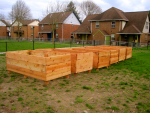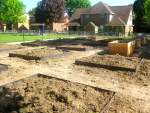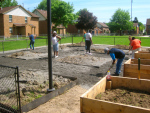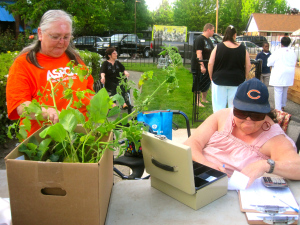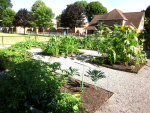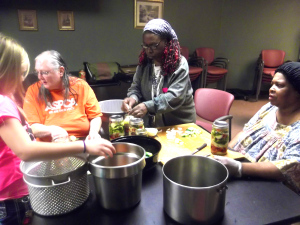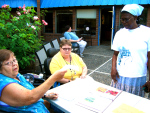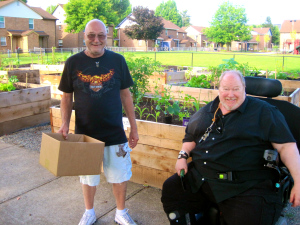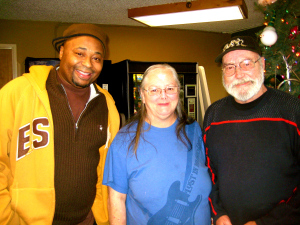Wasongolo grew up and spent much of his life in the Democratic Republic of the Congo and Burundi. After graduating from high school, Wasongolo spent three years teaching math and biology to seventh, eighth, and ninth graders. Looking to try something new, Wasongolo left teaching to attend the Higher Institution of Development (ISDR Bukavu) where he studied social organizing. “The idea of the school is to have trained professionals who can work for change, and work with people,” Wasongolo explains. “We learned about how you can organize [people], how you can come up with ideas that actually work. We get these ideas by making the community’s needs a priority.” After finishing school, Wasongolo completed a six-month internship in Burundi with LVIA, “an Italian organization dealing with solidarity and international cooperation,” which works “with the aims of fighting social inequality, food insecurity, and poverty and of operating concretely for peace and human development” (www.lvia.it/en). With LVIA, Wasongolo worked with marginalized populations and gained hands-on experience in community organizing, establishing a microcredit project with inspiration from the writings of Nobel Peace Prize recipient Muhammad Yunus and Cameroonian priest Jean Marc Ela.
After his internship in Burundi, Wasongolo returned to the Congo where he started working with various Catholic charities, namely Caritas-Development. He was in charge of many projects, but his overall role was going into communities, talking to people, and hearing directly from them about their actual needs. Wasongolo’s work changed again in 1994, when over 4.5 million refugees from Burundi and Rwanda fled to the Congo. Wasongolo became a supervisor for seven refugee camps, and in conjunction with the United Nations Refuge Agency (UNHCR), worked to get people connected to various social services, such as identifying women who were pregnant and providing them supplemental nutrition and clinical care. He was also in charge of burial materials and procedures, as people were dying every day. In addition, Wasongolo was involved in creating a program where refugees could make art to be sold in town, as a form of gaining income. In September of 1996, the First Congo War started, and after three years of doing this work, it became dangerous for Wasongolo and his family. He says that people working to help refugees, specifically people who believed in the rights of refugees, were the first to be targeted. So he and his wife left to Zambia, where they lived for seven years. His first year in Zambia, Wasongolo lived in a refugee camp. While in the camp, he organized a group of students from Burundi, Rwanda, and the Congo with the hopes of getting them back into school. Furthermore, Wasongolo started working with the Jesuit Refugee Program and the UNHCR in order to fight for the rights of refugees, including the right to education and the right to work. Wasongolo had a vision of finding ways to let refugees utilize their skills for economic agency. “Refugees are also human beings,” Wasongolo would advocate. “They cannot be considered objects.”
During this time, Wasongolo received a large sum of money through a connection with a Catholic nun from Portugal that was trying to help in their efforts of finding sustainable settlements for refugees. This money was intended for Wasongolo’s personal use, but he did not see it this way. “For me, this money was like ‘okay, now I can help people. I have to fight for the right of refugees.’” Wasongolo helped start a new effort to find new settlements for refugees. In conjunction with the Jesuit Refugee Program and other refugees, Wasongolo worked to get people relocated abroad. As Wasongolo describes it, this was a process of understanding the needs of the refugees by “meeting them where they are” and “listening, seeing, and taking action” in order to find the appropriate resettlements. After lots of grueling, hard work, these efforts enabled more than 600 families and individuals to resettle in the United States, Canada, Australia, and various European countries. After prioritizing others’ needs before his own and letting many, many people go ahead of himself on the list for resettlement, Wasongolo’s turn finally came. He and his family were relocated to the United States, which brought him here– to Portland, Oregon.
Wasongolo became involved with Village Gardens five years ago, when he moved to New Columbia and became a gardener at Seeds of Harmony. After a year of having his own garden plot, Wasongolo became a garden advocate. Through this position, Wasongolo shared his skills, knowledge, and ideas in the garden, and truly began to shine as a leader. After a year as a garden advocate, Wasongolo was hired as the Community Organizer for Village Gardens.
As a community organizer, Wasongolo says his job is “empowering community members and acting as a bridge and cultural mediator.” One of his biggest roles with Village Gardens has been getting folks in the community trained as Community Health Workers. In conjunction with the Community Capacitation Center at the Multnomah County Health Department, Village Gardens has trained over fifty Community Health Workers over the course of the past three years. Wasongolo organized all of these trainings, and has been a huge support in connecting Community Health Workers with different organizations around Portland. Wasongolo is a strong networker, and has connected Village Gardens with numerous groups and facilities such as the North Portland Clinic, Community Cycling Center, the Office of Equity and Inclusion, African Partnership for Health, Portland African American Leadership Health Committee, African Committee Advocacy Council, Family Advocacy Council, ACHIEVE, University of Portland School of Nursing, and many more. Wasongolo says that he aims to provide a wide diversity of workshops, trainings, and services, which motivates him to connect Village Gardens with as many different resources as possible.
Wasongolo explains that getting Community Health Workers educated and trained in public health is an important way to empower the community. To enable this to happen, Wasongolo has organized Village Gardens’ participation in various conferences, such as a conference in New Orleans held by the Community Food Security Coalition (CFSC) and a public health conference hosted by Kaiser. In addition, Wasongolo has organized the community’s involvement in Community-Based Participatory Research (CBPR), in which communities and academic institutions partner to promote health equity and social justice. Wasongolo explains that CBPR is an empowering and dynamic process in which “researchers aren’t just plugging things on people,” but rather, the community drives and designs all aspects of the research including research structure, research questions, outcomes, evaluation, collaborative solutions and dissemination of their findings.
Wasongolo says that the place of Community Health Workers in the community is essential. “Community Health Workers are the bridge between different services and programs that have to be connected with the community. Community Health Workers are like vessels bringing those things. Its like Village Gardens is a big river, and we have to make sure that people living around Village Gardens are getting water from Village Gardens. Community Health Workers have a big role to play because they are transferring their knowledge, deciding and directing our philosophies and services, and connecting people to their neighbors, community members, and beyond.”
Another important component of Wasongolo’s position is helping immigrant families adjust to their new residency in North Portland. His ability to speak many languages is key to this process– Wasongolo speaks Swahili, Kibembe, Nayanja, Kirundi, Kinyarwanda, French, Lingala, and English–languages of Zambia, Burundi, Rwanda, and the Congo. Wasongolo supports immigrants in various areas, including finding a job, filling out paperwork such as Section 8 or medical forms, and helping them become involved in their children’s education. As an immigrant himself, Wasongolo has great compassion for other immigrants in his community and is highly skilled at helping them assimilate. “Being new in a country, we are always frustrated,” Wasongolo says. “And a big issue comes up when we don’t know the language. Language is one way that makes people feel like they are accepted. [So when you don’t know the language], you are so frustrated and you feel like you are not accepted.” Wasongolo passionately expresses his desire to support his fellow community members transition into their new lives in Portland. Another way he does this is through his work with the African Women Coalition. “The big goal is to empower African woman,” Wasongolo says. By mobilizing and advocating for African woman in the community, Wasongolo says immigrant families can create a culturally supportive and nurturing environment. “Language is one barrier of communication, integration, and making friends,” he explains. “People want to make friends, but because the communication is breaking down, nothing can come out.” The African Woman Coalition is a supportive, safe space for the development of new friendships and opportunities.















